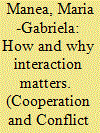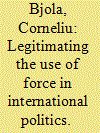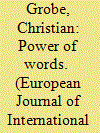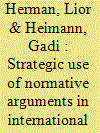| Srl | Item |
| 1 |
ID:
054357


|
|
|
| 2 |
ID:
086553


|
|
|
|
|
| Publication |
2009.
|
| Summary/Abstract |
The aftermath of the Cold War has brought a shift in the West's position on the acceptance and promotion of international human rights standards in developing countries. In this context, the Association of Southeast Asian Nations (ASEAN) member countries challenge the West's position based on two contradictory principles - comprehensibility and cultural embedment of human rights. In this article, I argue that interactions with regard to human rights involving state and non-state actors in ASEAN have become part of the process of regional identity formation. How ASEAN has responded to external pressures in terms of compliance with international human rights norms, and how it has developed its own normative and procedural approach to human rights at the regional level, are inherent in the dynamics of `Self' definition. A mixed pattern of `rhetorical' and `communicative action' explains how interaction has led to different phases - differentiation, affirmation, contestation and re-orientation - in the dynamics of `Self' definition of ASEAN with regard to human rights.
|
|
|
|
|
|
|
|
|
|
|
|
|
|
|
|
| 3 |
ID:
064499


|
|
|
| 4 |
ID:
095319


|
|
|
|
|
| Publication |
2010.
|
| Summary/Abstract |
Throughout the last two decades international negotiations have been predominantly analysed from the perspective of rationalist bargaining theory. But most recently, constructivists have pointed to a different mechanism that may facilitate agreement among multiple parties: processes of argumentation. Indeed, numerous empirical studies were successful in showing that words have the power to change the initial bargaining position of an actor and thereby impact on the outcome of multilateral negotiations. Rationalists have so far been unable to capture this important role of argumentative talk within their conceptual framework. Therefore, this article introduces a theory of rational persuasion, which I call functional persuasion theory. According to this theory argument-based changes in bargaining positions are entirely belief-driven and are not due to a reformulation of agents' preferences, as constructivists hold. The explanatory power of functional persuasion theory is demonstrated in the empirical part of this article by testing it against the most prominent constructivist explanations of argumentative persuasion.
|
|
|
|
|
|
|
|
|
|
|
|
|
|
|
|
| 5 |
ID:
178124


|
|
|
|
|
| Summary/Abstract |
This article claims that normative arguments play a greater role in negotiations than existing scholarship implies. While the approaches of communicative and rhetorical action limit the use of arguments to environments that meet certain conditions, in fact normative arguments are widely used and can be found in almost every example of negotiations. This article seeks to explain this phenomenon. Negotiating parties that feel obligated to tackle normative arguments raised by the opposing side – either because of the presence of an audience or to maintain its reputation – have a number of tools at their disposal. Negotiators who are unsuccessful in tackling these arguments will tend to offer a proposal that is more attractive to the other side. Although normative arguments do not generally have a sweeping influence on the outcome of negotiations, they are still likely to play a significant role. The article applies this theoretical framework to the case of the lengthy negotiations between the EEC and Israel, in which the former had no material motivation and desire to cede to Israel’s demands and nevertheless did so.
|
|
|
|
|
|
|
|
|
|
|
|
|
|
|
|